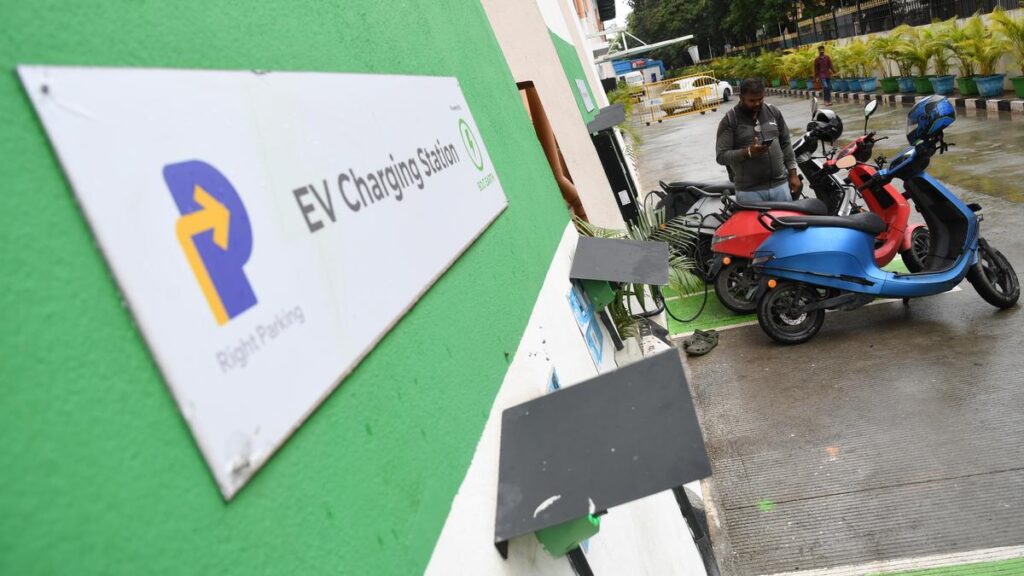Even as 1,04,415 new electric vehicles (EV) have come out on to the roads in Karnataka in 2025, the government has decided to drop its ambitious plan to set up 2,500 public EV charging stations across the State under the Public Private Partnership (PPP) model.
The Bangalore Electricity Supply Company (Bescom), which is the nodal agency for EV infrastructure in the State, stated that the project has been dropped after not receiving positive response from EV stakeholders.
In the Budget presented by Chief Minister Siddaramaiah for the year 2024–25, he had announced that 2,500 electric vehicle (EV) charging stations will be set up in the State under PPP model while 100 charging stations will be set up by escoms at a cost of ₹35 crore. A government order passed in June this year said that the plan to set up these charging stations has been dropped after considering the explanation provided by the managing director of Bescom.
Shiva Shankara N., managing director, Bescom stated that failure to set up public charging stations previously deterred stakeholders from coming forward to set up new stations.
“In 2023 –24, even though there was a government order to set up 585 charging stations under PPP in nine districts, even one station could not be established. In 2024–25, a tender was called to set up 605 EV charging stations in the remaining 22 districts. While no bid was received for 18 districts, there was a single bidder for the other four. However, other government departments did not cooperate with the agencies which were awarded the tender when it came to land leasing. It was not possible for Bescom to identify land where the agencies could set up stations according to their regulations,” he explained.
He further said that with not many EVs operational on the roads, agencies would be financially burdened if they established charging stations.
Companies highlight challenges
EV charging infrastructure providers said that they face many key challenges when it comes to setting up public charging stations.
Talking about the mismatch between demand and supply locations, Raghav Bharadwaj, CEO, Bolt.Earth, a provider of EV charging solutions said, “Most EV users—especially individual two-wheeler and four-wheeler owners—prefer to charge their vehicles where they already spend significant time, such as at home, office, cafes, or malls. Unfortunately, many government-allocated sites for charging (like bus depots, government land, or offices) are not aligned with natural user behavior or traffic flow, making them commercially unviable.”
He also said that inter-departmental coordination between Bescom, BBMP, and traffic police, which is often slow and complex leads to companies not having access to high utility spaces like curbside parking spots and electric pole-based charging, where people already park their vehicles to sleep, work, eat, or play.
“Deploying chargers in low-traffic areas with no guaranteed demand is risky and capital-intensive. Private players are wary of investing without clarity on land usage, electricity connection timelines, or return on investment. The PPP model, as currently structured, does not de-risk or incentivise early private participation adequately,” Mr. Bharadwaj further said.
Private players demand mandating charger integration into real estate development, creating awareness among citizens and incentivising infrastructure to encourage more EV charger usage.
EV users say that they are currently forced to charge the batteries of their vehicles at home as public infrastructure is unreliable. “There are many apps which show where public chargers are located. But when I go there, they might be out of service, or the charger might not be compatible with my vehicle. The government should provide more reliable public chargers in the city similar to how there are many petrol pumps,” said Aarathy Praveen, a regular EV user.
There are a total of 5.95 lakh EVs on road in Karnataka according to the data available with the Transport Department. Currently, to cater to this demand, the government has directed Bescom to take necessary steps for escoms to set up 100 charging stations at a cost of ₹35 crore.
Published – July 28, 2025 09:39 pm IST


